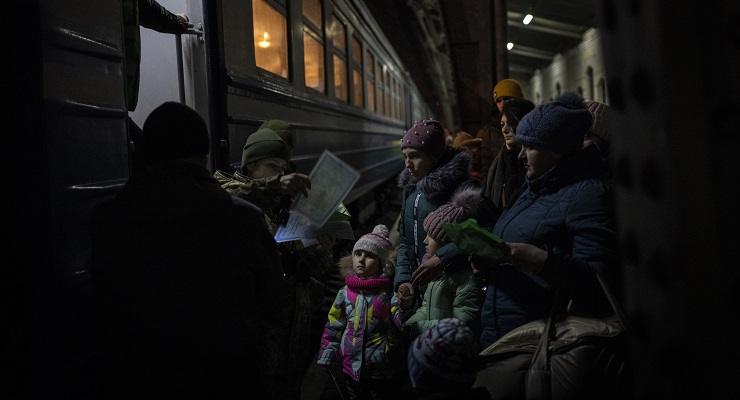
An estimated 800,000 people are trafficked across international borders every year. The Department of Home Affairs estimates there are 2.5 million working in forced labour or sexual exploitation at any given time, although other organisations put this figure as high as 30 million.
With more than 2.5 million people fleeing the invasion in Ukraine, NGOs and governments are raising the alarm about potential trafficking and abuse of refugees. Volunteers across Poland, Slovakia, Czechia, Moldova, Romania and even Australia are offering transport and accommodation to the primarily women and children fleeing — raising red flags about some of the volunteers’ motives.
Traffickers are ‘extremely opportunistic’
Human trafficking policy expert for charity organisation CARE Lauren Agnew tells Crikey she expected a spike in victim numbers as the European crisis wore on.
“We’re seeing refugees fleeing across borders, into countries which we already knew are hotspots and source countries for human trafficking,” she said. “The domino effect of this war will be displacement, and then with that we’re expecting to see a rise in cases of modern slavery in the coming months.”
With men aged between 18 and 60 not permitted to leave the country, most refugees are women, children or students with temporary resident permits. Nearly 80% of human trafficking globally is due to sexual exploitation, and almost 20% of all trafficking victims are children.
Ukraine is a source, transit and destination location for human trafficking victims, with victims sent to Russia, Poland, Turkey, China, Czechia and more to work as labourers, beggars and sex workers. In 2017 there were 342 known trafficking victims in Ukraine, up threefold from the year before.
Already one 49-year-old man has been detained in Poland after allegedly assaulting a 19-year-old Ukrainian refugee he lured over the internet, and in Romania men offering free rides to women have been sent away.
“Human traffickers will be waiting in the wings in these countries, ready to take advantage of this humanitarian crisis to exploit vulnerable individuals for profit,” Agnew said.
Some common tactics
Agnew says many of those stepping forward to offer transport and accommodation would be genuine — but many were red flags for her organisation. One tactic is for people to offer transport across borders, then demand the refugees pay back vast sums for the journey.
“This forces them to become indebted into these criminal gangs,” she said.
Another common tactic was called the “lover boy” technique, she says, where women are tricked into believing they’re in a loving relationship and trafficked into commercial sex work.
“Often they don’t see themselves as victims which makes it very hard to identify them and rescue them and offer them a way out,” Agnew said.
The situation in Australia
Anti-Slavery Australia estimates there are nearly 2000 victims of modern slavery in Australia, but only one in five are known to officials.
Slavery is difficult to prosecute as victims are often afraid to testify, meaning that between 2004 and 2021 just 31 offenders were convicted of the 1670 cases referred to the Australian Federal Police. More than one-third of cases related to forced marriage followed by labour exploitation.
Across Europe, most people convicted of human trafficking were women — many of whom were victims before being forced or coerced into recruitment in a cycle of exploitation.
In 2018, Australia established a Modern Slavery Act, with businesses with revenue above $100 million obliged to report annually on the risk of modern slavery in their operations and supply chains. States and territories have similar acts.
But many high-profile brands disclose only parts of their supply chain, excluding potentially the most insidious parts.
Agnew says governments need to improve assessment, protection and risk management in the face of the Ukraine refugee crisis.
“Governments need to step up their efforts to identify and protect individuals and to prevent them from falling victim to human traffickers,” she said. “This is an international crisis which requires an international response.”








Great article as always Amber. Off topic but you and Crikey must get sick of 4 corners ripping off your investigative journalism. I note tonight’s episode as one case in point.
I’s a real issue but I’m not sure if all governments are willing and/or able to do much in e.g. Central Eastern Europe?
Facts is, like refugees, there has been much suboptimal leadership while volunteers, NGOs, charities etc. have taken up the slack providing reception, accommodation and transit assistance (further into EU to friends/family).